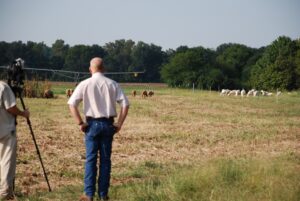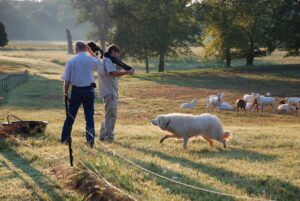Final report for STN16-001
Project Information
The overall objective of the Tennessee Model State Program is to include all parts of SARE into a seamless program. Interactions and feedback will occur within all categories of SARE proposals and grants. One major difference in the previous work and the model program is the increased emphasis on communications and publicity.
The University of Tennessee and Tennessee State University have made a strong commitment of resources to train agricultural professionals in the concepts of sustainable agriculture. The Program Assistant and SARE State Coordinators will keep the SARE website up-to-date. In 2016-2017, intensive training will be conducted in application of agriculture policy, risk management, local food systems, value added and alternative enterprises. The expected outcome is for the program in Tennessee to contribute to the overall mission of Southern SARE and meet the needs of Tennesseans.
Outreach objectives for Tennessee will address critical needs outlined in the current and revised plan and identified as priorities by the State Sustainable Agriculture Advisory committee. The overall objective of the Model Tennessee Program is to include all parts of SARE R&E, PDP, On-Farm Research, Sustainable Community, Producer and Graduate Student Grants into a seamless program.
This plan will prepare Extension agents, Extension area specialists, NGO personnel, state and local government employees, and farmer trainers with necessary tools to assist new and existing producers who are interested in pursuing sustainable agricultural production. Educators will instruct producers on sustainable agricultural management, production, finance, and risk management matters that ensure environmental stewardship, economic viability, and community development.
Interactions and feedback will occur within proposals and grants related to research, producer grants, on-farm research grants, professional development training and graduate student awards. The expected outcome is for the program in Tennessee to contribute to the overall mission of Southern SARE and meet the needs of Tennesseans. The mission of SARE is "to expand knowledge and adoption of sustainable agriculture practices that are economically viable, environmentally sound, and good for all members of the community."
Accomplishing the above mission will involve all parts of the sustainable agriculture program coming together. The final outcome is to develop, test, demonstrate, and evaluate technology and systems that will be required to create and maintain sustainable (efficient, competitive, profitable, environmentally and socially acceptable) farming operations over the next several decades. The program will also focus on the quality of life in both the overall rural areas engaged in agriculture and at the farm-level where production occurs.
In summary, the funds will be utilized effectively to improve communications, reach out to new audiences, enhance efforts with traditional audiences, and provide a consistent message about sustainable agriculture. Details related to how the money will be utilized effectively are contained in the sections of the proposal addressing responsibilities of the program assistant and delivery approaches.
Advisors
Education
The Tennessee project utilizes the traditional and trademark approach to SARE educational programming - namely "train the trainer." Through our tours, workshops and in-service training, our specialists and experienced Extension professionals educate Extension agents, area specialists and producers.
Education & Outreach Initiatives
Teach and educate Extension agents and producers sustainable and profitable production and marketing ideas and techniques to increase profitability and sustainability.
This past year, 39 nursery growers and Extension agents from 14 counties learned about new plant material, water quality and conservation, proper pesticide application, and creative marketing techniques over a three-day nursery, greenhouse, and turf management tour.
Growers and landscapers reported an average economic impact of over $6,500 per operation. Total estimated economic impact was $320,000. One hundred percent of participants agreed that the educational tour was beneficial and would recommend it to other nursery producers.
Teach and educate agricultural professionals, officials, and farmers in sustainable production practices.
A small farm expo was held where agricultural experts taught sustainable production practices, including organic urban agriculture, portable livestock fencing, greenhouse gas emissions, and soybean genomic research to agricultural professionals and farmers.
Outcomes include a better understanding of sustainable production practices that can be, in turn, taught to others in the agricultural industry.
Train Extension Agents on sustainable fruit and vegetable production.
Extension agents were trained in the areas of irrigation and fertilizer efficiency, food safety, and intelligent sprayer technology.
Extension agents were able to learn topics that can be used, in turn, to train producers.
Teach and educate Extension agents and specialists on topics pertaining to farm and financial management.
This workshop taught principles of individual and family financial stress management in times of financial downturns, and farm sustainability when farms face declining markets.
Six Extension agents, eight area specialists, and nine state specialists received training that they, in turn, could use to teach farm and financial management educational programs.
To teach and educate Extension agents in small ruminant production and management.
Farm tours were conducted on numerous sheep and goat farms in Tennessee. Sessions were taught on de-wormers; dairy goat production; auctions; parasite resistance; and value-added enterprises.
 Shooting video for use as a virtual tour during the Small Ruminant Tour.
Shooting video for use as a virtual tour during the Small Ruminant Tour.

Seventeen Extension agents were taught management and production practices for small ruminants which they, in turn, can use to instruct producers.
Educational & Outreach Activities
Participation Summary:
Learning Outcomes
Project Outcomes
Our funding of the small ruminant program is a fairly recent addition to our SARE programming and is generating a great deal of interest.
Face of SARE
The SARE program is well-known in Tennessee. Information is shared with Extension agents and specialists via our website, emails, and public meetings. Our Program Assistant fields numerous calls each year from individuals requesting more information regarding grants and opportunities. Often, these contacts are paired up with the appropriate UT or TSU specialist for additional assistance on the given commodity.